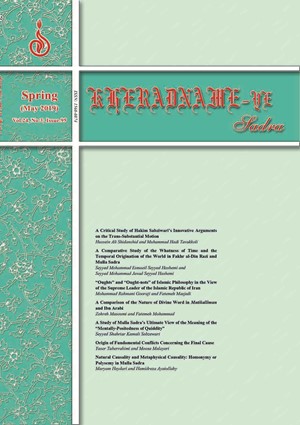-
-
List of Articles
-
Open Access Article
1 - “Oughts” and “Ought-nots” of Islamic Philosophy in the View of the Supreme Leader of the Islamic Republic of Iran
Mohammad Rahmani Gooraji Fatemeh Masjedi -
Open Access Article
2 - Natural Causality and Metaphysical Causality: Homonymy or Polysemy in Mulla Sadra
Maryam Heydari Hamid Reza Ayatollahy -
Open Access Article
3 - Origin of Fundamental Conflicts Concerning the Final Cause
Yaser Taherrahimi Musa Malayeri -
Open Access Article
4 - A Critical Study of Hakim Sabziwari’s Innovative Arguments on the Trans-Substantial Motion
Hussein Ali Shidanshid Mohammad Hadi Tavakkoli -
Open Access Article
5 - A Study of Mulla Sadra’s Ultimate View of the Meaning of the “Mentally-Positedness of Quiddity”
Seyyed Shahriyar Kamali Sabziwari -
Open Access Article
6 - Editor's Note
Seyyed Mohammad Khamenei -
Open Access Article
7 - A Comparative Study of the Whatness of Time and the Temporal Origination of the World in Fakhr al-Din Razi and Mulla Sadra
Seyyed Mohammad Esmaeil Seyyed Hashemi Seyyed Mohammad Javad Seyyed Hashemi -
Open Access Article
8 - A Comparison of the Nature of Divine Word in Mutikallimun and Ibn Arabi
Zohreh Masoumi Fatemeh Mohammad
-
The rights to this website are owned by the Raimag Press Management System.
Copyright © 2017-2026







